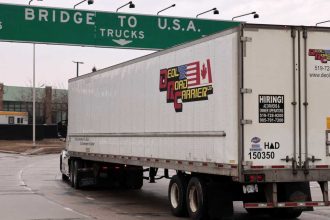Unlock the Editor’s Digest for free
Roula Khalaf, Editor of the FT, selects her favourite stories in this weekly newsletter.
Shadow chancellor Rachel Reeves would seek to break down EU trade barriers and secure billions of pounds through an early international investment summit if Labour wins the general election.
In an interview with the Financial Times, Reeves signalled an ambitious push to revisit parts of Boris Johnson’s Brexit deal, including seeking closer alignment with EU rules in areas such as the chemicals sector and a better deal for workers in the City of London.
“We would look to improve our trading relationship with Europe, and do trade deals around the world,” she said, as she vowed that an incoming Labour government would “reset” Britain’s global image.
Her comments signal that Labour wants to go further than previously thought in seeking better UK-EU trade terms, tackling head-on the “adversarial” Conservative post-Brexit relationship with Brussels and ditching a Tory fixation on regulatory divergence.
“I don’t think anyone voted Leave because they were not happy that chemicals regulations were the same across Europe,” Reeves said. “When my constituency voted leave it was purely because of immigration.”
Labour has been reluctant to talk about Brexit in the election campaign, but as polling day approaches — and with the party 20 percentage points ahead of the Conservatives — Reeves and Labour leader Sir Keir Starmer have given more glimpses of what they hope to achieve.
She also said Labour would take risks and was willing to “upset some people” to unlock the potential of the British economy, adding that she would use her political capital by pushing for growth rather than “having a fight about different taxes”.
Ahead of the July 4 election, the Conservatives have warned of a Labour “tax trap”. But Reeves insisted the party could fund its priorities without resorting to tax rises on the wealthy, adding: “We’re not seeking a mandate to increase people’s taxes. We’re seeking a mandate to grow the economy.”
On Brexit, any attempt to reopen what Starmer has called Johnson’s “botched” 2020 trade deal with the EU would be highly complicated; there is little appetite in Brussels for a renegotiation and long-standing opposition to the idea of Britain “cherry-picking” parts of the bloc’s single market.
Reeves talked about a “bespoke” arrangement for the chemicals industry, which is in talks with the government about a new regulatory system intended to avoid £2bn of extra costs associated with having to register products with a new UK regime.
She reiterated Labour’s existing red lines in the area, saying there would be no rejoining the single market or customs union, and that freedom of movement and a deal on youth mobility were off the cards. These will limit the scope of any future EU deal.
Reeves stressed the importance of seeking greater mutual recognition of professional qualifications with the EU, pointing to the benefits this would entail to the services sector, including financial services.
“The majority of people in the City have not regarded Brexit as being a great opportunity for their businesses,” she said, arguing that services and financial services were “pretty much excluded” from Johnson’s Brexit deal.
But she said that Labour’s manifesto promise to seek a mutual recognition deal for professional qualifications with the EU, along with a veterinary deal and improved touring rights for UK artists were “examples” of what she wanted to achieve. “That’s not exclusive,” she said.
Reeves said she accepted the Office for Budget Responsibility’s assessment that Brexit would lop 4 per cent off Britain’s productivity potential.
The shadow chancellor, who on Monday will host senior business leaders at a meeting of her new “shadow” British Infrastructure Council, said she wanted a Labour government to hit the ground running and exploit the fact that the world would be looking afresh at the UK after election day.
Among the further steps in the first 100 days of a Labour government would be an investment summit that aimed to lure in foreign investors who had been deterred by political instability in the UK, she said.
Reeves said she had spoken that morning to a business leader in the City who had said their global chief executive had been reluctant to come to a recent UK investment summit organised by Prime Minister Rishi Sunak’s government.
“They said ‘What’s the point, we’re just getting a bit tired of what’s happening in the UK. Do I have to come to this?’,” Reeves said. “This is a real reset moment to a different way of doing government.”
She added: “It’s not just inviting businesses in for a summit, but really bringing them into the centre of government. I want to make the Treasury not just a tax-and-spending department but a department for growth.”
Reeves said there was “a role for investment” from countries including China and Saudi Arabia, but added that it was right that Sunak’s government had excluded Chinese investment from the rollout of broadband and future nuclear projects.
Read the full article here




